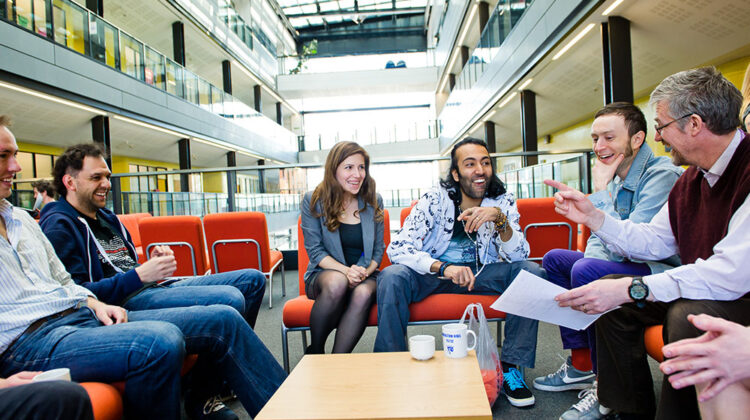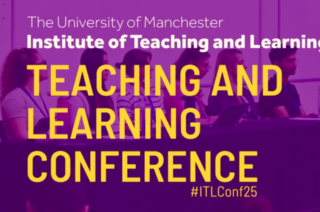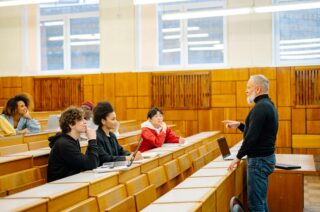Creating a sense of community and inclusion through T&L

On Wednesday 13th September 2023 there was a showcase and discussion of ‘Creating a sense of community and inclusion through T&L’, bringing together speakers from across the Faculty. The talks and slides from the showcase event are below. If you would like to learn more about this area, a good place to start is the Inclusive Higher Education Framework from QAA and The University of Hull.
Aurelie Le Normand & Charlene Gallery (Department of Materials)
Communities of Practice (CoP) is defined as a group of people that share a common interest and come together to investigate ideas to expand their practice (Wenger, 1998). Although CoPs are age old and well established in industry, it is yet to be extensively adopted within education (Mercieca and McDonald, 2021). To develop a sense of community, we have implemented this year a peer-to-peer exhibition between two 10 credits units, counting 120 students. The aim was to create an inclusive and safe environment where every student had the opportunity to curate and present their work to their peers and had the opportunity to receive formative feedback from their peers. The two units were splits into three large groups and then each group divided further into groups of 6 students with three students from each unit, creating a real mix of students, encouraging an inclusive and collaborative learning environment. The feedback from students were overwhelmingly positive. In this scenario, Communities of Practice was embedded seamlessly within the students learning journey, and this CoP allowed students to explore ways in which they can expand their practice through collaboration, exchange, and reflection.
aurelie.lenormand@manchester.ac.uk & charlene.gallery@manchester.ac.uk
Louise Walker (Department of Mathematics)
** Please note this video is not available due to an issue with the recording **
Working with students as partners (SaP) is a pedagogical approach that involves students and academic/support staff working collaboratively to improve teaching, learning and the student experience. Rather than a ‘you said, we did’ approach, there is an ongoing dialogue between students and staff. The emphasis is on ‘respect, reciprocity and shared responsibility in learning’. (Engagement through partnership: students as partners in learning and teaching in higher education, Healey M., Flint A. and Harrington K., Higher Education Academy).
In this talk I will highlight some of the recent SaP work in the Department of Mathematics that has helped us develop new guidelines around coursework and co-design study skills sessions.
louise.walker@manchester.ac.uk
Jennie Blake (UoM Library – Head of Teaching and Learning Development, Institute of T&L – Academic Lead for Student Success)
Belonging, becoming and mattering have all been recognised as key elements of student engagement and success. At a university the size of Manchester, with its diverse programmes, cohorts and approaches, tackling belonging at an institutional level is a complex and wicked problem. This talk will look at two areas of current activity focusing on belonging at Manchester:
- The Belonging Network: Launched in parallel with an AdvanceHE project around belonging (led by Jo Conlon) this network of students and staff is focused on supporting those working on projects and initiatives around belonging. With nearly 100 members, it is focused on a Teams channel and hosts events that encourage engagement with sector-wide and international work on the topic, driving more rigorous and consistent evaluation of activity and aligning parallel projects to increase potential impact. In addition, it is deliberately structured to also support recognition for work done in this area, linking those in the network to support for LEAP fellowships, conferences and other sector recognition.
- The transition/pre-arrival resource: this mini-module is in its second iteration for the 2023-24 academic year. It focuses on addressing specific areas where incoming students might feel anxious, normalising typical hiccoughs in transition to HE and representing the diverse cohort of students at Manchester. The talk will focus on the research behind the design of the resource and its initial use (with the potential for some updates on engagement this academic year), in addition to how it might fit in to other initiatives around community and belonging.
Charlene Gallery (Department of Materials)
The Implementation of Emancipatory Pedagogy: Transformational Impact on Transitional Learning: Diversity and inclusivity are central concerns in the contemporary educational landscape, with a pressing need to confront the exclusionary practices prevalent within Higher Education Institutions (HEI). This presentation will delve into the efforts to challenge the Eurocentric principles that dominate curricula and often marginalise students. The focus of the project is to transcend mere knowledge transmission, reshaping education into a transformative, social, and holistic process. It aims to decolonise existing paradigms and disrupt conventional power dynamics between educators and students, thereby catalysing significant change within higher education. This inclusive approach to curriculum creation forms a part of a broader strategy to confront and reform the embedded colonial ideologies in our education system.
Within the framework of a digital branding project, the presentation will illustrate how an egalitarian learning environment has been cultivated, transforming students from passive recipients into critically engaged participants. By removing barriers to participation, the project encourages a critical examination of political, socio-cultural dimensions, and the consequences of social inequity in marketing paradigms. The inclusive curriculum empowers students to celebrate diverse backgrounds, heritage, and values, fostering a sense of personal belonging and academic self-reliance. The presentation will also explore the project’s innovative approach to incorporating marginalised perspectives and its implications for creating a more equitable, inclusive, and socially just world. The proposed methodology serves as a compelling model for modern education, contributing to the critical dialogue surrounding diversity and inclusivity in education.



It seems there is an issue here, with the abstracts for Talks 3 and 4 being identical. It would be nice for the fourth abstract to show correctly.
Hello Andrea, The abstracts are now updated. Best wishes Rebecca